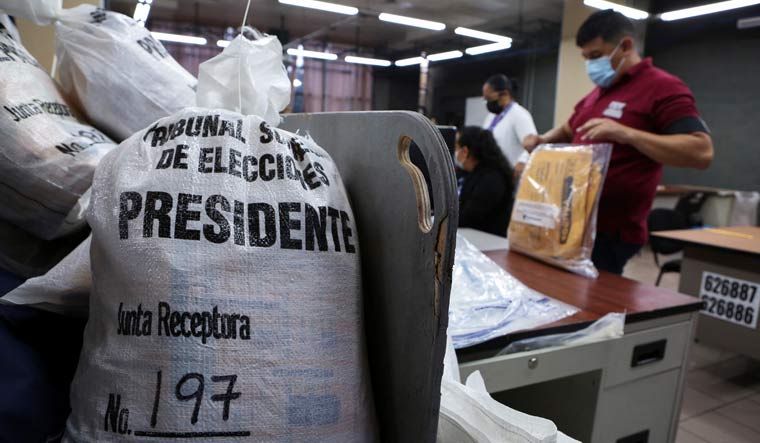There is a reason why the world media has not paid any attention to the Costa Rican elections held last Sunday for presidency and the Congress. There was no extreme rightist or radical leftist candidates like Trump or Ortega nor was there any serious polarisation, electoral fraud, outrageous fake news, controversial conspiracy claims or refusal of the verdict by the defeated.
The media finds the peaceful, quiet and predictable Costa Rican elections as ‘boring’ and devoid of any juicy sensational stuff. Even the Costa Ricans showed indifference to the elections and 40 per cent of the voters failed to show up at the polling stations.
Out of the 25 presidential candidates, Jose Maria Figueres of the National Liberation Party (PLN) got the largest share of votes with 27.3 per cent followed by 16.7 per cent of Rodrigo Chaves of the Party for Social Democratic Progress (PSD). Figueres is the favourite to win in the second round of elections to be held on April 3.
Figueres has a degree from Harvard and has worked in the business sector both inside the country and outside. He is the son of the legendary Jose Figueres (Don Pepe) who was president three times in 1948-49, 1953-58 and 1970-74. He was the president who abolished the armed forces in 1948 and made history.
The Costa Rican constitution does not allow two consecutive terms for presidency or for membership of the Congress. Just six of the newly elected 57 deputies have served in the Congress before. In the elections for the Congress, the National Liberation party of Figueres got 27 per cent of the votes and got 18 seats. The Social democratic party of Rodrigo Chavez came second with 14.6 per cent and 9 seats. The rest of the seats were shared between four other parties.
Irrespective of whoever wins the presidential elections, the country will continue with its tradition of consensual and mature governance focusing on sustainable development, renewable energy, eco-friendly tourism and peaceful coexistence with the neighbours.
Costa Rica has remained as a beacon of solid and vibrant democratic stability and maturity in Latin America in the last seven decades. The country has held regular elections every four years and peaceful transfer of power in the last 60 years. This is remarkable and distinct in the contemporary history of Latin America where many countries had suffered military dictatorships, civil wars and interruption of democracies.
Costa Rica has made history in the world by having abolished its armed forces in 1948. It is a civilisational advance. The country proclaims proudly that they spend their money on education and healthcare instead of arms. Oscar Arias, the former president and Nobel Peace Prize winner said: “Our children walk with books under their arms rather than guns on their shoulders. We are an unarmed people, whose children have never seen a fighter or a tank or a warship. We are a people without arms and we are fighting to continue to be a people without hunger. My country is a country of teachers and peace. We discuss our successes and failures in complete freedom. We believe in dialogue, in agreement, in reaching a consensus, in convincing our opponents, not defeating them. We prefer raising the fallen to crushing them, because we believe that no one possesses the absolute truth."
It is true that most of the political leaders come from the small number of oligarchic families in the country, as in many other countries in the region. But the Costa Rican oligarchy is an enlightened one with a social conscience. The governments have pursued a policy of inclusive development, irrespective of whether they are conservatives or liberals. The four million citizens enjoy the benefits of a modern social welfare state including pensions, labour legislation, national health care and a life expectancy of 77.
In 1869, the country became one of the first in the world to make education both free and obligatory, funded by the state’s share of the great coffee wealth. The literacy rate of over 95 per cent is one of the highest in Latin America. Even the coffee growing land is distributed among 100,000 families and not monopolised by the oligarchy. Costa Rica was the first country in Central America to give voting rights to women and people of African origin in 1948. It is because of this equity in the society that there has been no revolutionary leftist outsider to challenge the status quo as it happened in some other countries in the region.
Costa Rica is a leader in sustainable development, clean energy and ecotourism. It was one of the first in the world which combined its ministries of energy and the environment back in the 1970s. The country generates an impressive 99 per cent of its energy from renewable sources.
Costa Rican President Carlos Alvarado signed a decree in February 2019 to fully decarbonise by the year 2050. "Decarbonisation is the great task of our generation and Costa Rica must be one of the first countries in the world to accomplish it, if not the first”. He has set a goal of zero-emission public transportation system by 2035. This is not the personal agenda of the President Alvarado. This policy was pursued by his predecessor and there is a consensus among all the political parties of the country and continuity of policies by successive governments.
Costa Rica has remained as a beacon of peace, right in the middle of the Central American region which has suffered so many conflicts and civil war till the nineties and is even now continuing to face very high rates of crime and violence.
I wish more countries in Latin America follow the example of the “boring” elections of Costa Rica, a small country of five million people but has a big lesson for the world.
The author is an expert in Latin American affairs.





